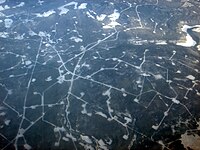Economy of Alberta

Imagine you have a piggy bank that you put money in every week. The more money you put in, the more you have to spend on things you want, like toys or candy. This is kind of like the economy of Alberta, which is a place in Canada where lots of people live and work.
Instead of a piggy bank, though, the economy of Alberta mostly relies on something called natural resources. Natural resources are things that come from the Earth, like oil, gas, and minerals. Just like how you put money in your piggy bank, companies in Alberta dig up and sell these natural resources to make money.
When companies make a lot of money, they can hire more people to work for them. This means there are more jobs available for people in Alberta. People with jobs can then use their money to buy things they want, like food, clothes, and houses.
But sometimes, the economy of Alberta can have problems. For example, if the price of oil goes down (oil is a really important natural resource in Alberta), companies might not be able to make as much money. This means they might have to lay off some workers, which is not good for the people who lose their jobs.
Another thing that can affect the economy of Alberta is something called a recession. This is when lots of companies are struggling to make money, and people stop spending as much. When that happens, there might be fewer jobs available, which means people have less money to spend. It can be a little bit like when you have less money in your piggy bank, and you can't buy as many things you want.
Overall, the economy of Alberta is like a big piggy bank that relies on natural resources like oil and gas to make money. When things are going well, lots of people have jobs and can buy things they want. But when things aren't going well, it can be tough for people who live and work in Alberta.
Instead of a piggy bank, though, the economy of Alberta mostly relies on something called natural resources. Natural resources are things that come from the Earth, like oil, gas, and minerals. Just like how you put money in your piggy bank, companies in Alberta dig up and sell these natural resources to make money.
When companies make a lot of money, they can hire more people to work for them. This means there are more jobs available for people in Alberta. People with jobs can then use their money to buy things they want, like food, clothes, and houses.
But sometimes, the economy of Alberta can have problems. For example, if the price of oil goes down (oil is a really important natural resource in Alberta), companies might not be able to make as much money. This means they might have to lay off some workers, which is not good for the people who lose their jobs.
Another thing that can affect the economy of Alberta is something called a recession. This is when lots of companies are struggling to make money, and people stop spending as much. When that happens, there might be fewer jobs available, which means people have less money to spend. It can be a little bit like when you have less money in your piggy bank, and you can't buy as many things you want.
Overall, the economy of Alberta is like a big piggy bank that relies on natural resources like oil and gas to make money. When things are going well, lots of people have jobs and can buy things they want. But when things aren't going well, it can be tough for people who live and work in Alberta.
Related topics others have asked about:
